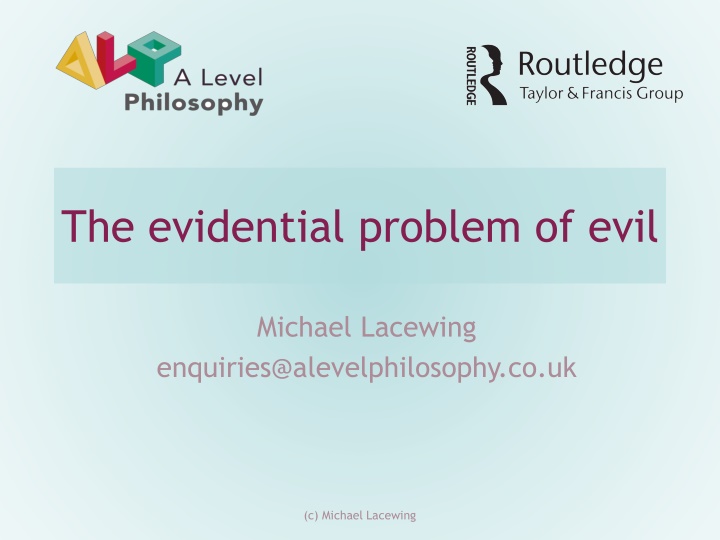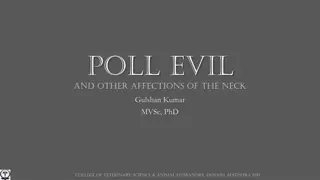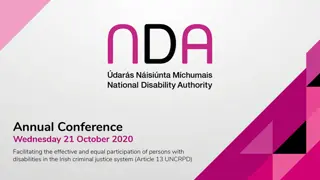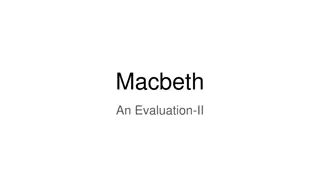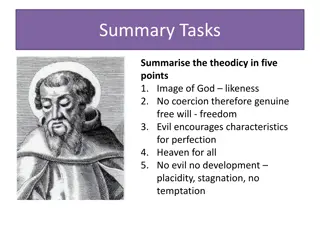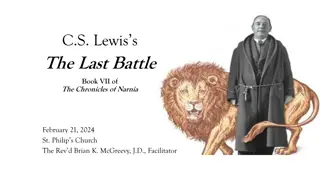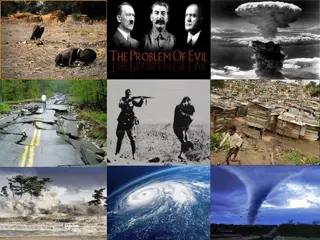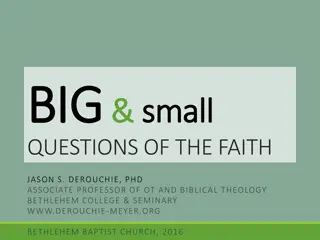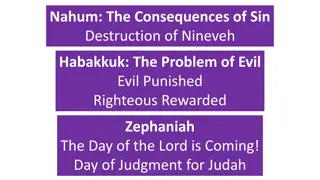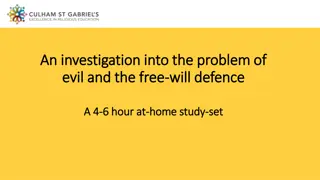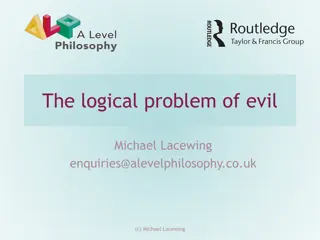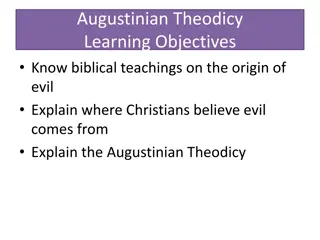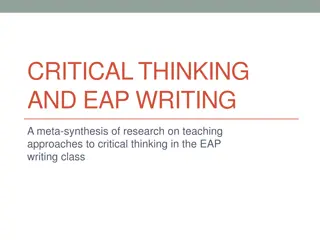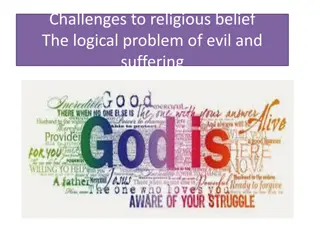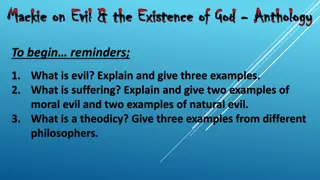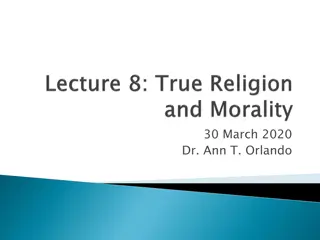The Evidential Problem of Evil: A Critical Analysis
This discussion delves into the complex philosophical arguments surrounding the problem of evil, examining how the existence of evil intersects with the traditional attributes of a supreme deity. It explores the logical and evidential dimensions of evil's existence in relation to God's omniscience, omnipotence, and moral goodness, reflecting on how different types of evil, such as moral and natural evils, challenge the concept of a benevolent God. The Plantinga's Free Will Defense is also considered as a response to the problem of evil.
Download Presentation

Please find below an Image/Link to download the presentation.
The content on the website is provided AS IS for your information and personal use only. It may not be sold, licensed, or shared on other websites without obtaining consent from the author.If you encounter any issues during the download, it is possible that the publisher has removed the file from their server.
You are allowed to download the files provided on this website for personal or commercial use, subject to the condition that they are used lawfully. All files are the property of their respective owners.
The content on the website is provided AS IS for your information and personal use only. It may not be sold, licensed, or shared on other websites without obtaining consent from the author.
E N D
Presentation Transcript
The evidential problem of evil Michael Lacewing enquiries@alevelphilosophy.co.uk (c) Michael Lacewing
The problem of evil If God is supremely good, then he has the desire to eliminate evil. If God is omnipotent, then he is able to eliminate evil. If God is omniscient, then he knows that evil exists and knows how to eliminate it. Therefore, if God exists, and is supremely good, omnipotent and omniscient, then evil does not exist. Evil exists. Therefore, a supremely good, omnipotent and omniscient God does not exist. (c) Michael Lacewing
The logical problem of evil The mere existence of evil is logically incompatible with the existence of God. The following claims cannot all be true: God is supremely good. God is omnipotent. God is omniscient. God exists. Evil exists. (c) Michael Lacewing
The evidential problem of evil The amount and distribution of evil that exists is good evidence that God does not exist. Given evil as we experience it, it is not impossible that God exists. However, it is not reasonable to believe that God exists. The argument is not deductive, but inductive. It appeals to specific types or instances of evil. Some evils are necessary for certain goods, e.g. suffering makes sympathy and benevolence possible True, but there is also unnecessary evil, e.g. war, ethnic cleansing, natural disasters, illness (c) Michael Lacewing
Two types of evil Moral evil: evil caused by moral agents through choice Natural evil: pain and suffering caused by natural processes, e.g. earthquakes, predation etc. Some responses to the problem of evil may deal with one type of evil, but not the other. (c) Michael Lacewing
Plantingas free will defence A world containing creatures that are significantly free is better than a world containing no free creatures. God can create significantly free creatures. To be significantly free is to be capable of both moral good and moral evil. If significantly free creatures were caused to do only what is right, they would not be free. Therefore, God cannot cause significantly free creatures to do only what is right. (c) Michael Lacewing
Plantingas free will defence Therefore, God can only eliminate the moral evil done by significantly free creatures by eliminating the greater good of significantly free creatures. It is possible that Satan exists and that natural evil is the effects of his actions, so natural evil is a form or consequence of moral evil. Therefore, it is possible that God can only eliminate natural evil by eliminating the greater good of significantly free creatures. (c) Michael Lacewing
Plantingas free will defence The conclusion is not asserted as true, but as possible It is possible that there is no better balance of good and evil than the one that exists. Obj: It is possible, but is it probable? Reply: We have no evidence against the claim Our experience of evil doesn t make it less likely that God exists. (c) Michael Lacewing
Objection Plantinga only considers the total amount of evil, rather than kinds and distribution of evil or specific instances It is these that provide evidence that a better balance is possible Is free will so good that God would never interfere with it? Is a better, or more limited, type of free will possible? In particular, is Satan s free will so good as to justify all natural evil? (c) Michael Lacewing
Hick: Vale of soul-making We are unfinished creations Stage 1: evolution of creatures capable of a relationship with God Stage 2: individual development towards virtue and relationship with God Such virtuous development is impossible unless there is evil to respond to and correct This applies to both natural and moral evils God does not seek to minimise pain, because it enables us to develop (c) Michael Lacewing
Virtue and value God can create creatures with ready-made virtues But the virtues we achieve that result from challenges, discipline, and overcoming temptation, are good in a richer and more valuable sense And God cannot create beings that respond to God in authentic faith and love without free will (c) Michael Lacewing
Objections What about animal suffering? Animals don t grow spiritually, so how is the natural evil that they suffer justified? Is it plausible that terrible evils are really necessary for our moral and spiritual growth? A great deal of evil doesn t (appear to) contribute to spiritual growth. (c) Michael Lacewing
Hick: Animals Animals: live in the present without fear of death or of future pains or dangers And to be alive means to be subject to pain (much of our suffering they don t share, e.g. self-pity, the desire to escape mortality etc) Wouldn t a world without animals and their pain be better? In such a world, we would lose our cognitive freedom To respond to God freely, we need to be able to understand the world as one in which God doesn t exist Animals provide such an account of our existence Thus animals are necessary for our development (c) Michael Lacewing
Hick: Terrible evils Terrible evils are terrible in contrast to more ordinary evils If we remove the terrible ones, the next-to- terrible ones will seem exceptional and we will wonder why those are permitted. If we remove more evils, the world with little evil is also a world with little human freedom, responsibility and development (c) Michael Lacewing
Hick: Pointless evil Evil that appears not to contribute to soul- making cannot be rationalised. However, the existence of such irrational evils is part of the process of soul-making Imagine such a world in which we knew, on every occasion when someone suffered, that it was for the best. We would lack deep sympathy, faith and hope For us to develop, it must look like evil is unjustified (c) Michael Lacewing
Hick: life after death Unless evil does lead to development, it is unjustified Therefore, there must be life after death, since many do not achieve virtue before death In fact, there must be universal salvation (c) Michael Lacewing
